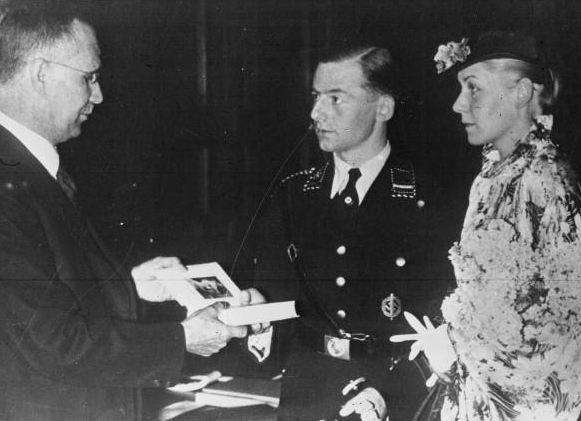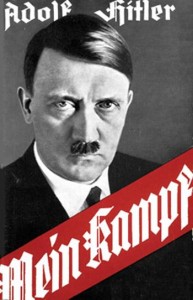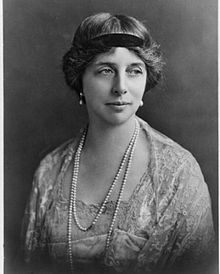
When Did Churchill Read “Mein Kampf”?
 Q: Mein Kampf
Q: Mein Kampf
When did Churchill first read Mein Kampf, and did he have any early reaction to it?” Of Mein Kampf in his war memoirs, he wroe:
…there was no book which deserved more careful study from the rulers, political and military, of the Allied Powers. All was there—the programme of German resurrection, the technique of party propaganda; the plan for combating Marxism; the concept of a National-Socialist State; the rightful position of Germany at the summit of the world. Here was the new Koran of faith and war: turgid, verbose, shapeless, but pregnant with its message.[1]
“But he writes nothing about it before this.
A: 1935, if not sooner
The answer is undetermined, but we can narrow down the time frame. I looked for this in my Hitler chapter of Winston Churchill, Myth and Reality. I searched his correspondence for mentions of Mein Kampf from 1925, when it was first published. Churchill did not read German and there is no indication that he saw the German editions at that time.
There is no evidence that Churchill read Mein Kampf until at least 1933[2]. Most likely, Martin Gilbert reports, he read it in 1935 (see below). But he was aware of Hitler earlier. His friend Sir Ian Hamilton furnished the first reference to Hitler in Churchill’s official biography. In October 1930. In the September federal elections, Hitler’s National Socialists soared from 12 to 107 seats, second highest in the Reichstag. The ruling Social Democrats fell slightly to 143, the German Communist Party tripled its seats with 77.
Hamilton and Cuno
Churchill was anxious to know what this election foretold. Hamilton passed him the views of the German shipping magnate and onetime chancellor, Wilhelm Cuno. What Hamilton described as Hitler’s “scoop” was, according to Cuno, natural and hopeful:
He said that out of the 32 million people in Germany there were 29 million who were finding life just about intolerable and they were absolutely fed up with it. In their minds they had resolved to sweep away the whole of the existing system of compromise, makeshift and trying to win their way back by slow degrees on the old lines.
They were jolly well going to have a try at something entirely new and the whole question, for people like himself who had something to say with the steering of the ship of State, was whether the change would be to the right or to the left. If to the right it would be an accentuation of nationalism: if to the left it would be internationalism. They had got their swing to the right and he hoped that the responsibility of power would make this new Government more moderate in action than it had been in words.[3]
Cuno was however likely to put a favorable spin on the Nazi surge. Two years later he would join Wilhelm Keppler as a financial advisor to Hitler. His death in 1933 spared him whatever ignominy that might have attached to him through further association. The worst that can be said of Churchill over this early intelligence from Germany was that he too hoped for moderation. Like many others, he misgauged the depth of Hitler’s prejudice and hate. But it didn’t take him as long as most others to realize the truth.
Mein Kampf in 1935
The first known Churchill encounter with Mein Kampf was five years later—two years after Hitler took power and the first English edition was published. By then, as Martin Gilbert tells us, he was fully up to speed:
Churchill was also well informed about the internal situation in Germany. Three months earlier, on 10 December 1935, at Churchill’s own request, L.G. Montefiore had sent him a full translation not only of the Nuremberg Laws, under which the Jews of Germany had been deprived of their basic rights as citizens, but also of the detailed administrative regulations, whereby those Laws were to be put into force. On March 10 the Duchess of Atholl sent him two copies of Hitler’s Mein Kampf, the original German edition and the English translation.[4]
Katharine Stewart-Murray, 8th Duchess Atholl was determined that Churchill should know the truth. The English translation of Mein Kampf sent to the London publisher was watered down to soothe British nerves. Atholl sent Churchill
copies of those passages which had been expurgated in the translation. “Sometimes,” she wrote, “the warlike character of the original is concealed by mistranslating.” In one of the expurgated passages Hitler advocated a German alliance with Italy and Britain, in order to isolate France. In another he described France as “our bitterest enemy.” And in a third he declared: “the life of a people will be secured not by national grace, but by the strength of a victorious sword.” The Duchess of Atholl also sent Churchill extracts from Hitler’s speeches with copies of those more extreme paragraphs which had not been circulated to the foreign press.[5]
The Duchess of Atholl…
…is one of the forgotten heroines in Churchill’s battle against appeasement. Lynne Olson’s Troublesome Young Men finely describes this feisty Scotswoman, the first Conservative woman Member of Parliament to hold ministerial office:

For Kitty Atholl, Mein Kampf served as a call to battle. No longer the docile backbencher who wanted to “smooth matters over,” she became an outspoken foe of appeasement. She again joined forces with Churchill, this time in his campaign to awaken Britain to the dangers posed by Hitler and the need for rearmament. Like Churchill, she received confidential information from knowledgeable sources about the rapid pace and size of German rearmament, which she passed on to him and to officials in the Foreign Office…. Many Tories in her constituency, which contained more than its share of aristocrats, landed gentry, and retired military officers, were outraged.[6]
By the time of the Munich accord, the Duchess was thoroughly repulsed by Chamberlain’s actions. She made speeches denouncing the agreement, and published a pamphlet about it. For this the Conservative whip was withdrawn and Chamberlain sent surrogates to oppose her in a by-election. She lost her seat in November 1938, and a few months later Chamberlain himself came to defend his policies in Scotland.
Churchill was furious. On a visit to the Highlands, another friend told him Chamberlain was coming and asked where she should set up the podium. “It doesn’t matter where you put it,” Churchill replied, “as long as he has the sun in his eyes and the wind in his teeth.” His famous lisp often surfaced strongly at times of great emotion. So this came out: “shun in hish eyesh and the wind in hish teeth.”[7]
Endnotes
1. Winston S. Churchill, The Gathering Storm (London: Cassell, 1948), 42.
2. Adolf Hitler, Mein Kampf, 2 vols., (Berlin: Eher Verlaf, 1925-26). An abridged English edition was first published by Hurst & Blackett, London, on 13 October 1933, though excerpts appeared in The Times during July.
3. Ian Hamilton to Churchill, 24 October 1930 (Churchill Papers: 8/269), in Martin Gilbert, ed., The Churchill Documents, vol. 12, The Wilderness Years 1929-1935 (Hillsdale, Mich.: Hillsdale College Press, 2009), 208-09.
4. Martin Gilbert, Winston S. Churchill, vol. 5, Prophet of Truth 1922-1939 (Hillsdale College Press, 2009), 704.
5. Ibid.
6. Lynne Olson, Troublesome Young Men: The Rebels Who Brought Churchill to Power and Helped Save England (New York: Farrar, Straus & Giroux, 2007), 167.
7. Martin Gilbert, In Search of Churchill (London: HarperCollins, 1994), 23.







One thought on “When Did Churchill Read “Mein Kampf”?”
I was aware of Mein Kampf and the fact that Churchill had read it at least by the mid 1930s. But what I did NOT know and I learned from your post was that the first English translation BOWLDERIZED and SOFTENED Hitler’s language and there were people who pointed this out to Churchill. That weak translation was another form of appeasement. Thank you for sharing this fact.
Comments are closed.